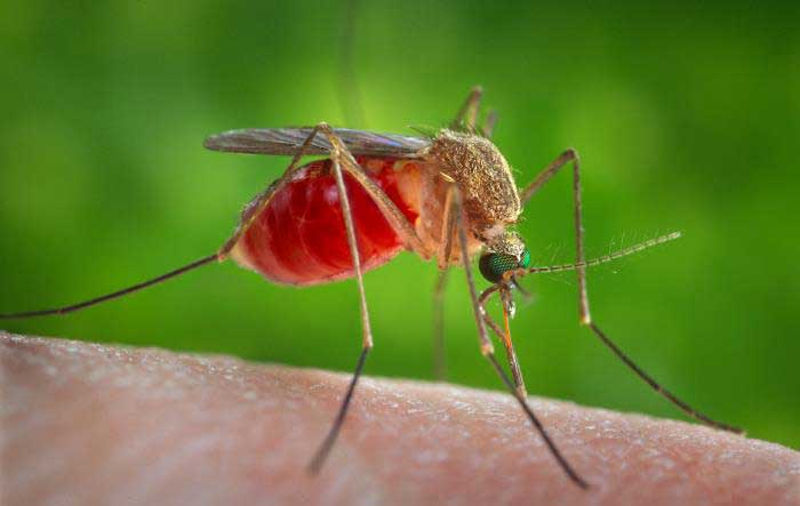
The West Nile Virus is spread to people and animals through the bites of infected mosquitoes. NMDOH recommends the use of insect repellent on exposed skin and clothing when outdoors.
Photo courtesy CDC
Last week veterinarians at The Ark of Socorro tested a horse positive for West Nile Virus.
State health officials say they have identified five cases of West Nile virus infections across New Mexico and that wet weather may be a factor.
Recent rains have left areas of standing water that make good breeding grounds for mosquitos that spread the disease, and the Department of Health recommends that residents regularly drain containers or places of standing water such as empty cans, clogged gutters and wading pools.
As of last week, DOH says that no deaths have been reported so far this year but that five cases were reported among residents in the northern counties of Bernalillo, Doña Ana and Taos.
Alexandra Eckhoff, DVM, field veterinarian with the New Mexico Livestock Board, said during years where the state gets a lot of water, “invariably we’re going to see a rise in numbers (of West Nile Virus).”
The West Nile Virus is spread to people and animals through the bites of infected mosquitoes. “If we start seeing cases in horses that test positive for West Nile, that tells the Department of Health that likely we’re going to start seeing cases in humans, as well,” she said. “That’s the link we have. Quite frankly, I know we’ve had confirmed cases, at least four or five that have been called in to us.”
Eckhoff said mosquitoes become infected when they feed on infected birds. The birds become infected by the bites of infected mosquitoes. “This is how the cycle continues,” Eckhoff said.
“Primarily, only horses get sick when infected with West Nile, however, many infected horses do not develop any illness or symptoms.”
But horses don’t pass it on from one horse to another.
“Other livestock and poultry can become infected with the virus but do not commonly get sick.
Although dogs or cats can become infected with West Nile, clinical signs rarely appear,” she said. “An unusual number of dead birds is going to be good flags for surveillance for West Nile.”
In Socorro, the city utilizes two preventative methods to keep mosquitoes at bay.
Utilities Director Lloyd Martinez said control measures include vector spraying and mosquito dunks.
“We do both,” Martinez said. “For the standing water, Joe Melendrez puts the dunks in there.
If there’s evidence of larvae we’ll go back and put out the briquettes.”
According to Martinez, the tablets have an effective radius of 100 sq. ft. and are good for one month in the water. The dunks are bacterial spore that is toxic to the mosquito and blackfly larvae when ingested.
He said Melendrez has been conducting vector control throughout the city and even the county through the spraying of an insecticide that mimics the hormones required for metamorphosis, keeping them from becoming an adult. A vector is anything that carries a disease. In this case, the vector is the mosquito, which carries the West Nile Virus or malaria.
“Joe goes out late at night and sprays certain areas of the town at certain times,” he said. “And the county will call him and give him their areas of concern. The county pays the city to spray.”
Common West Nile virus symptoms are fever, nausea, headache and muscle aches. In some rare cases, the virus can cause meningitis or encephalitis. If someone has these symptoms, they should see their health care provider.
More serious symptoms include high fever, severe headache, neck stiffness, disorientation, tremors, convulsions, muscle weakness, vision loss, numbness and paralysis.
In addition, mosquitos carrying the virus were detected throughout Albuquerque and Bernalillo County by Albuquerque’s Health Department.
“Mosquitoes infected with West Nile virus will be around until there is a good hard frost in the area, so we urge people to continue to take precautions against mosquito bites throughout the rest of the season,” said Dr. Mark DiMenna, deputy director of Albuquerque’s Environmental Health Department.
According to the New Mexico Department of Health, there have been no human West Nile virus cases in the state so far this year.
In 2020, there were eight cases with one death. The year before – 2019 – it was a different story with 40 cases and four deaths in New Mexico.
There were also two asymptomatic blood donors who tested positive for West Nile Virus in New Mexico in 2019; one from Socorro County and one from Valencia County.
Health officials urge New Mexicans to take precautions against mosquito bites.
People can take preventative measures by keeping weeds down and not overwatering.
To lessen the risk of being bitten by one of the virus-carrying mosquitoes:
Stay indoors at dawn, dusk and early evening.
Wear long-sleeved shirts, long pants and socks whenever you are outdoors.
Use insect repellent products with no more than 35 percent DEET for adults and follow directions on the label for children from ages two to 12. Products containing soybean oil and eucalyptus oil have also been shown to be effective but need to be applied more often.
Keep windows and doors closed if not screened. If you leave your house doors or windows open, make sure they have screens that fit tightly and have no holes.
Do not allow water to stagnate in old tires, flowerpots, trash containers, swimming pools, birdbaths or pet bowls.
Horse owners should contact their veterinarian to have their horses vaccinated against West Nile Virus.


















